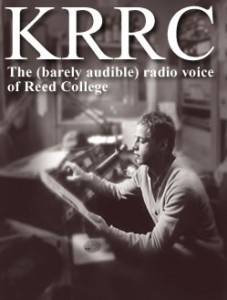Reed College’s tiny radio station KRRC struggled to be heard over the Portland, Oregon airwaves and now its terrestrial days may be over. Last week paperwork was filed to transfer the class D license for KRRC to Common Frequency, a non-profit devoted to community and grassroots radio. There’s a silver lining to this story, as the donation of this license to Common Frequency may actually save a tiny slice of the terrestrial dial in Portland since Reed had initially planned to simply dispose of the license.
Late last year KRRC’s license holder (The Reed Institute) turned the KRRC 97.9FM class D license back to the FCC. According to FCC records, the license was cancelled and the call sign was deleted on November 29, 2011 “per Licensee’s request.” Terrestrial broadcasts ceased on November 30, 2011 and the station moved to an online-only format. A story back in October in Reed’s student publication, The Quest, delves further into KRRC’s move off FM and stated that finances were a big factor. In response to that news, a number of concerned alumni began talking about fundraising options for KRRC back in December. Reed’s Director of Student Activities and KRRC advisor Kristin Holmberg explained that the move off FM was precipitated by KRRC losing its frequency to a commercial radio group. She said,
“Two years ago, we learned that a Cumulus station had bought our frequency. Since we were getting bumped, we spent a long time looking for a new frequency in town. Our dial was full and bigger stations wouldn’t consent to let us settle between them. It was clear that we would eventually have to shut down.
In the meantime, student interest in radio was lagging. It’s hard to have a totally student run station without a professional station manager involved. It’s also expensive to run a broadcast station.
There had already been some student interest in going to a web broadcast format. It’s much easier to operate and doesn’t require adherence to a large number of very technical FCC regulations. We wouldn’t have to pay lawyers to help us navigate the system as well. When we laid out all the issues, it was a pretty easy decision for the students to tell me they wanted to drop our FCC license.”
Although this sounded quite definitive at the time, Reed had a change of heart. Over the winter break, a Petition for Reconsideration was filed with the FCC by the Reed Institute. The FCC granted the Petition for Reconsideration on January 25, 2012 and the license was reinstated on the same day. On February 2, an application for the assignment of license to Common Frequency was accepted for filing by the FCC. Today, the FCC accepted for filing the Reed Institute’s request to take KRRC silent “while searching for possible channel relocation” in light of Cumulus’ plans to move commercial station KNRQ onto KRRC’s frequency.
According to Common Frequency’s Program and Technical Director Todd Urick,
“Recently KRRC’s frequency was reallocated by the FCC to a commercial broadcaster moving into Portland. Because Reed had a secondary-service ‘Class D’ low power radio license–a type of campus broadcast license phased-out by the FCC in the late 70s–it needed to yield to any commercial broadcaster wanting to use that channel. In the absence of any other open radio channels in Portland–coupled with broadcast coverage limited to campus (8 watts) and persistent legal and engineering expenses associated with the channel–Reed has discontinued broadcasting to concentrate on online streaming.”
In similar cases, other universities have simply turned their class D licenses back in to the FCC, as was the case with both the Paul Smith’s College station WPSA and the Central College station KCUI back in December, 2011. With the scarcity of available frequencies on the terrestrial dial, it’s always surprising and sad to me to hear of potentially usable licenses being turned back to the FCC. With that in mind, Urick explained that Common Frequency was interested in helping to preserve Reed College’s channel for community use in Portland. He explained that,
“Common Frequency…has agreed to pursue any ditch attempts to invest engineering and legal resources to search for possible solutions for the defunct radio channel. The central Portland area has no viable open channels primarily due to the proliferation of licensed translators, translator applications, and commercial stations changing their communities of license into the Portland market. For the slim possibility that any option is found for purchasing a translator or moving the channel outside of central Portland, Common Frequency intends to provide that channel back to the local community for student and community usage.”
Regarding the transfer of the license to Common Frequency, Holmberg added,”It seems like a nice thing for us to do since we weren’t using it.” She said that the online-only station is still a work in progress, saying, “…we’re not up and running yet! But hope to be soon!” Urick also told me that he’s spoken with Reed students about various options for resuming terrestrial broadcasts on campus.
With a history dating back to 1955, student radio at Reed has existed in a number of forms, with various call sign changes and frequency changes over the years. Some amazing photos documenting the station’s past, including a picture of alumnus Dr. Demento, can be found in a Reed digital archive.



